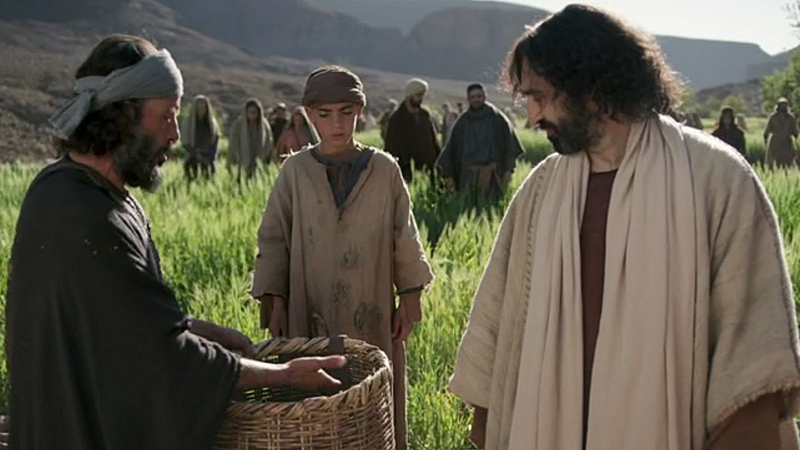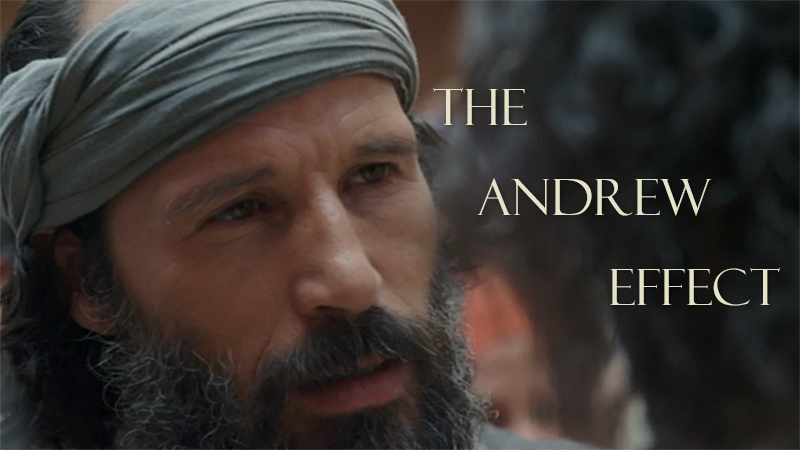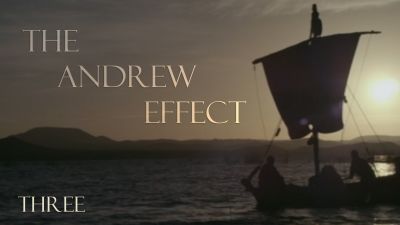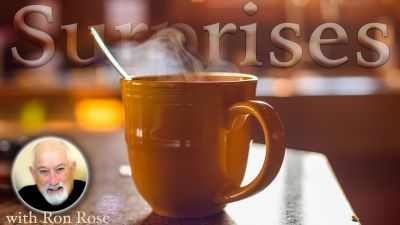"Send the crowds away..." (Matthew 14:15).
This occasion was not the apostles' finest hour.
Don't be too hard on them. The mob was hounding Jesus because they had heard about his miracles, and they wanted to experience one for themselves (Matthew 14:13).
In addition, this day was not a typical day of ministry. Jesus' cousin and forerunner, John the Baptizer, had just been brazenly executed by Herod (Matthew 14:1-12). The Lord knew that his cousin's fate was a precursor to his own death (Mark 9:12-13; Matthew 11:12-14). Jesus wanted to get away from the crowd and be alone with the Father and with his grief (Matthew 14:13). When the crowd had seen Jesus leave by boat, they took off on foot to beat him to his destination. They were waiting for him when he arrived (Mark 6:32).
"Send the crowds away..."
We can't be sure if the apostles said this because they were bone-weary or trying to protect Jesus. It didn't really matter. Jesus had welcomed the demanding horde to himself. The Lord had spoken the truth about God's kingdom and healed broken bodies and tormented souls (John 6:2; Luke 9:11). The hour of the day was late. The people were hungry. Jesus was exhausted and grieving. The apostles were weary and confused. To state it more accurately, Jesus was exhausted from pouring himself into ministry while working with the suffocating strain of unspeakable grief. The mob was a long way from anywhere. They had no food. Under the circumstances, who could blame the apostles for saying...
"Send the crowds away..."
"No," the Good Shepherd told them, "you give them something to eat!"
What?
Jesus' response made no practical sense. His words overloaded the circuit breakers in their brains. Their neurons hit a dead end. Their hope of helping the crowd had set long before the sun would set. Their energy was gone. The resources were scarce. Despite all they had just seen the Lord do through them (Luke 9:1-10), faith while in their current moment of impossibility was too hard to muster.
"You give them something to eat!" Jesus told them (Luke 9:13). His words of command were as unexpected as they were impossible. At that moment, everything in them said...
"Send the crowds away..."
So, Jesus turned to Philip, the apostles' practical get-it-done guy. The Lord asked Philip, "Where can we buy bread for all these people?"
Jesus had a plan. He was moving from teaching the crowds to training his disciples in the mathematics of faith. Philip, however, quickly calculated the problem in the mathematics of sight: "It would take more than half a year's wages just to buy enough bread for each person to have a bite" (John 6:7).
Hmm. I guess such calculations should have settled the issue once and for all. Impossible! Not enough bread and not enough funds, and not enough faith!
"Send the crowds away..."
Then Andrew interrupted. Notice that Andrew wasn't asked to give input. Jesus didn't put him on the spot as he had Philip. Andrew stepped forward on his own. His words were strange - almost childish. "Here's a boy with five barley loaves and two small fish..."
Well, that's nice, Andrew. It's sweet the little guy is willing to share, but let's get real here: He doesn't have much to share! So with what had to be a voice half-full of expectation and half-full of not having anything else to say, Andrew concludes with the words, "but how far will they go among so many?" (John 6:9).

"I believe you can do something about this huge problem using this boy's picnic lunch, Lord. But I also know what I'm bringing you seems small and childish, but I still believe you can do something with it. I believe, Lord, but please help my unbelief!" That's sure what Andrew seems to be saying here.
You've been in this situation before, haven't you? I know I have. We have found ourselves in the middle of a big mess. We didn't cause it, but that doesn't matter. People were hurting. They needed help. We wanted to help. The problems, however, were way too big and way too profoundly entrenched for us to make a difference with our inadequate skills and meager resources. What we had to offer was simply too little in the face of such enormous problems and deep needs. We didn't know what to do, so we did the best we could: We cried out for the Lord to help us. A tiny sliver of faith was all we had to offer. And that tiny sliver was all the Lord needed to step into the mess and do the impossible.
Unfortunately, we also know the many times we walked away from trying to address a problem because we couldn't find our sliver of faith... or were too tired to get involved... or were grieving in our hearts... or didn't have time to invest in another thing... or we just couldn't see any way we could be of help. On those days, we hung our heads dejectedly as the crowds went home hungry, and we walked away with heavy hearts full of regret. Our voice had blended with the voice of the apostles who long ago had said:
"Send the crowds away..."
Andrew's ridiculous approach to this immense problem was to bring a boy with a picnic-sized happy meal to Jesus in order to solve a mass hunger problem. As crazy as it was, the move was faithful to the Andrew we know. He was doing what he always did: Andrew connected people with Jesus. In this case, he took a little boy who was willing to share his lunch while risking the humiliating rebuke of his friends and adults so he could offer his ridiculously meager gift to the Savior. Of course, the boy believed in a Jesus who could do the impossible, and life hadn't beaten that childlike faith out of him. Yes, this is one of the few incidents in Jesus' ministry - outside of the Passion - to be recorded in Matthew, Mark, Luke, and John! Andrew, the boy with the picnic basket, 11 unworthy apostles, with a crowd of more than 5,000, received a miracle that was important enough for all four gospels to record it.
"The Andrew Effect"* is all about connecting people with Jesus. This example of Andrew's special ministry is one for all of us to notice, especially if we lead at any spiritual level. In this case, Andrew did something more important than bringing a needy person to the Lord. He brought a generous person, one who wanted to help in a difficult situation, to Jesus. He brought a boy willing to share all he had to help feed a hungry mob. Andrew then connected the boy and his picnic lunch with Jesus.
After a little organization of the crowd by Jesus' apostles and a prayer of blessing from the Lord, those meager resources were more than enough to feed the hungry masses (John 6:10-11; Mark 6:39-40). Jesus had the 12 apostles pick up the leftover scraps after dinner to drive the point home. The Lord wanted his apostles to hold the proof of this miracle and the power of "The Andrew Effect" in their hands. They picked up 12 baskets full of broken pieces (John 6:42-44), a basket full for each of them.
Imagine the delight on the face of the boy when he realized the incredible blessing that came through his generosity. I would love to have a picture of the expressions on their faces as they held the tangible grace of Jesus in their own hands! Such is the power of "The Andrew Effect" when we connect other believers to Jesus when they want to use what they have to bless those in need.
Those who have tried to find volunteers to meet overwhelming needs hang on to this story of Andrew, a boy, and Jesus. We know how easily we can become cynical and jaded. Sadly, we know that our voices all too often have joined with the apostles to say:
"Send the crowds away..."
Others of us are simply too practical to risk losing face when confronted with great need. "We don't have half enough money to meet the need!"
"Send the crowds away..."
Others of us have seen too many potential kingdom superstars burn out trying to do too much too soon all at the same time while wrestling with their own burdens and grief.
"Send the crowds away..."
Today, the example of Andrew with a boy and his picnic lunch knocks on the door of our hearts. Andrew's actions challenge us to bring what few generous volunteers we have to the Lord to meet a great need, then trust the Lord to do what we cannot. Andrew's example asks us to "go in the strength you have" (Judges 6:14) and use just our sliver of faith and offer what we have to the Lord.
Andrew's actions with the boy who was willing to share his five barley loaves and two small fish challenge us to adopt this third element** of "The Andrew Effect." Andrew's actions call us to believe what the apostle Paul told the Corinthians:
And God is able to bless you abundantly, so that in all things at all times, having all that you need, you will abound in every good work. ... Now he who supplies seed to the sower and your store of seed and will enlarge the harvest of your righteousness. You will be enriched in every way so that you can be generous on every occasion, and through us your generosity will result in thanksgiving to God (2 Corinthians 9:8-11).
The Lord is looking for modern versions of Andrew. His search is not gender or age-specific, or experience-specific. Jesus is looking for us to bring others to him - not just others in need but also those who want to help people in need. The Lord is looking for us to risk believing that he can make our meager resources big enough to bless others "immeasurably more than all we ask or imagine" (Ephesians 3:20).
Many Philips out there can say, "Lord, we've got more bread than peanut butter to spread. There's not enough of us and our resources to get the job done!" It's easy to say in the face of such great need...
"Send the crowds away..."
Andrew found the little boy who would share his lunch and connected him with Jesus. The crowd walked away that day with full bellies, and the cleanup detail picked up twelve baskets full of leftovers.
That, dear friend, is a part of "The Andrew Effect" that we must reawaken in a world of deep hurt and great need!
Jesus is waiting for us to say with a voice of expectation, "Here's all I've got, but what is that among so many?"

1 "The Andrew Effect" involves the four key pieces with an introduction. You can find more on the various components and movements of the "The Andrew Effect" in the following posts:
- Intro: Connecting People to Jesus.
- One: Connecting to Jesus Personally.
- Two: Connecting Those We Know to Jesus.
- Three: Connecting Those Who Want to Help with Jesus.
- Four: Connecting People of Other Cultures to Jesus.
* "The Andrew Effect" is a look at what the Gospel of John reveals about the heart of Jesus' apostle Andrew.
Images complementary of Free Bible Images and The Lumo Project.













Comments
Have thoughts on this article? Leave a comment